- Home
- Ken Follett
World Without End Page 11
World Without End Read online
Page 11
The earl dismounted at the prior's house, on the north side of the cathedral. His younger son, Richard, did the same. Richard was bishop of Kingsbridge and the cathedral was, theoretically, his church. However, the bishop's palace was in the county town of Shiring, two days' journey away. This suited the bishop, whose duties were political as much as religious; and it suited the monks, who preferred not to be too closely supervised.
Richard was only twenty-eight, but his father was a close ally of the king, and that counted for more than seniority.
The rest of the entourage rode to the south end of the cathedral close. The earl's elder son, William, lord of Caster, told the squires to stable the horses while half a dozen knights settled in to the hospital. Ralph moved quickly to help William's wife, Lady Philippa, get down from her horse. She was a tall, attractive woman with long legs and deep breasts, and Ralph nurtured a hopeless love for her.
When the horses were settled, Ralph went to visit his mother and father. They lived rent-free in a small house in the southwest quarter of the town, by the river, in a neighborhood made malodorous by the work of leather tanners. As he approached the house, Ralph felt himself shriveling with shame inside his red-and-black uniform. He was grateful that Lady Philippa could not see the indignity of his parents' situation.
He had not seen them for a year, and they seemed older. There was a lot of gray in his mother's hair, and his father was losing his eyesight. They gave him cider made by the monks and wild strawberries Mother had gathered in the woods. Father admired his livery. "Has the earl made you a knight yet?" he asked eagerly.
It was the ambition of every squire to become a knight, but Ralph felt it more keenly than most. His father had never got over the humiliation, ten years ago, of being degraded to the position of pensioner of the priory. An arrow had pierced Ralph's heart that day. The pain would not be eased until he had restored the family honor. But not all squires became knights. Nevertheless, Father always talked as if it were only a matter of time for Ralph.
"Not yet," Ralph said. "But we're likely to go to war with France before long, and that will be my chance." He spoke lightly, not wishing to show how badly he yearned for the chance to distinguish himself in battle.
Mother was disgusted. "Why do kings always want war?"
Father laughed. "It's what men were made for."
"No, it's not," she said sharply. "When I gave birth to Ralph in pain and suffering, I didn't intend that he should live to have his head cut off by a Frenchman's sword or his heart pierced by a bolt from a crossbow."
Father flapped a hand at her in a dismissive gesture and said to Ralph: "What makes you say there will be war?"
"King Philip of France has confiscated Gascony."
"Ah. We can't have that."
English kings had ruled the western French province of Gascony for generations. They had given trade privileges to the merchants of Bordeaux and Bayonne, who did more business with London than with Paris. Still, there was always trouble.
Ralph said: "King Edward has sent ambassadors to Flanders to form alliances."
"Allies may want money."
"That's why Earl Roland has come to Kingsbridge. The king wants a loan from the wool merchants."
"How much?"
"The talk is of two hundred thousands pounds, nationwide, as an advance against the wool tax."
Mother said bleakly: "The king should take care not to tax the wool merchants to death."
Father said: "The merchants have plenty of money--just look at their fine clothes." There was bitterness in his tone, and Ralph observed that he had on a worn linen undershirt and old shoes. "Anyway, they want us to stop the French navy interfering with their trade." Over the last year, French ships had raided towns on the south coast of England, sacking the ports and setting fire to ships in the harbors.
"The French attack us, so we attack the French," said Mother. "What is the sense of it?"
"Women will never understand," Father replied.
"That's the truth," she said crisply.
Ralph changed the subject. "How is my brother?"
"He's a fine craftsman," said his father, and he sounded, Ralph thought, like a horse salesman saying that an undersize pony was a good mount for a woman.
Mother said: "He's smitten with Edmund Wooler's daughter."
"Caris?" Ralph smiled. "He always liked her. We played together as children. She was a bossy little minx, but Merthin never seemed to mind. Will he marry her?"
"I expect so," Mother said. "When he finishes his apprenticeship."
"He'll have his hands full." Ralph got up. "Where do you think he is now?"
"He's working in the north porch of the cathedral," Father said. "But he might be having his dinner."
"I'll find him." Ralph kissed them both and went out.
He returned to the priory and wandered through the fair. The rain had stopped and the sun was shining fitfully, glinting in the puddles and raising steam off the stallholders' wet covers. He saw a familiar profile, and the regular footsteps of his heart faltered. It was the straight nose and strong jaw of Lady Philippa. She was older than Ralph, about twenty-five, he guessed. She was standing at a stall, looking at bolts of silk from Italy, and he drank in the way her light summer dress draped itself lasciviously over the curves of her hips. He made her an unnecessarily elaborate bow.
She glanced up and gave a perfunctory nod.
"Beautiful materials," he said, trying to open a conversation.
"Yes."
At that moment, a diminutive figure with untidy carrot-colored hair approached: Merthin. Ralph was delighted to see him. "This is my clever older brother," he said to Philippa.
Merthin said to Philippa: "Buy the pale green--it matches your eyes."
Ralph winced. Merthin should not have addressed her in such a familiar way.
However, she did not seem to mind too much. She spoke in a tone of mild reproof, saying: "When I want a boy's opinion, I'll ask my son," but as she said it she gave him a smile that was almost flirtatious.
Ralph said: "This is the Lady Philippa, you fool! I apologize for my brother's cheek, my lady."
"What's his name, anyway?"
"I'm Merthin Fitzgerald, at your service anytime you find yourself hesitating over silks."
Ralph took his arm and led him away before he could say anything else indiscreet. "I don't know how you do it!" he said, with exasperation and admiration equally mixed. "It matches her eyes, does it? If I said something like that, she'd have me flogged." He was exaggerating, but it was true that Philippa usually responded sharply to insolence. He did not know whether to be amused or angry that she had been indulgent to Merthin.
"That's me," Merthin said. "Every woman's dream."
Ralph detected bitterness in his tone. "Is anything wrong?" he said. "How's Caris?"
"I've done something stupid," Merthin replied. "I'll tell you later. Let's look around while the sun's out."
Ralph noticed a stall where a monk with ash blond hair was selling cheese. "Watch this," he said to Merthin. He approached the stall and said: "This looks tasty, brother--where does it come from?"
"We make it at St.-John-in-the-Forest. It's a small cell, or branch, of Kingsbridge Priory. I'm the prior there--my name is Saul Whitehead."
"It makes me hungry to look at it. I wish I could buy some--but the earl keeps us squires penniless."
The monk cut a slice off the wheel of cheese and gave it to Ralph. "Then you shall have some for nothing, in the name of Jesus," he said.
"Thank you, Brother Saul."
As they walked away, Ralph grinned at Merthin and said: "See? As easy as taking an apple from a child."
"And about as admirable," Merthin said.
"But what a fool, to give his cheese away to anyone with a sob story!"
"He probably thinks it's better to risk being made a fool of than to deny food to a starving man."
"You're a bit sour today. How come you're allowed to cheek a
noblewoman, but I can't talk a stupid monk into giving me free cheese?"
Merthin surprised him with a grin. "Just like when we were boys, eh?"
"Exactly!" Now Ralph did not know whether to be angry or amused. Before he could make up his mind, a pretty girl approached him with eggs on a tray. She was slim, with a small bust under a homespun dress, and he imagined her breasts to be pale and round like the eggs. He smiled at her: "How much?" he said, though he had no need of eggs.
"A penny for twelve."
"Are they good?"
She pointed at a nearby stall. "They're from these hens."
"And have the hens been well serviced by a healthy rooster?" Ralph saw Merthin roll up his eyes in mock despair at this sally.
However, the girl played along. "Yes, sir," she said with a smile.
"Lucky hens, eh?"
"I don't know."
"Of course not. A maid understands little of these things." Ralph scrutinized her. She had fair hair and a turned-up nose. She was about eighteen, he guessed.
She batted her eyelids and said: "Don't stare at me, please."
From behind the stall a peasant--no doubt the girl's father--called: "Annet! Come here."
"So your name is Annet," Ralph said.
She ignored the summons.
Ralph said: "Who is your father?"
"Perkin from Wigleigh."
"Really? My friend Stephen is lord of Wigleigh. Is Stephen good to you?"
"Lord Stephen is just and merciful," she said dutifully.
Her father called again. "Annet! You're wanted here."
Ralph knew why Perkin was trying to get her away. He would not mind if a squire wanted to marry his daughter: that would be a step up the social ladder for her. But he feared that Ralph wanted to dally with her then discard her. And he was right.
"Don't go, Annet Wigleigh," Ralph said.
"Not until you've bought what I'm offering."
Beside them, Merthin groaned: "One is as bad as the other."
Ralph said: "Why don't you put down the eggs and come with me. We could stroll along the riverbank." Between the river and the wall of the priory grounds there was a wide bank, covered at this time of year with wildflowers and bushes, where courting couples traditionally went.
But Annet was not that easy. "My father would be displeased," she said.
"Let's not worry about him." There was not much a peasant could do to oppose the will of a squire, especially when the squire was wearing the livery of a great earl. It was an insult to the earl to lay hands on one of his servants. The peasant might try to dissuade his daughter, but it would be risky for him to restrain her forcibly.
However, someone else came to Perkin's aid. A youthful voice said: "Hello, Annet, is all well?"
Ralph turned to the newcomer. He looked about sixteen, but he was almost as tall as Ralph, with broad shoulders and big hands. He was strikingly handsome, with regular features that might have been carved by a cathedral sculptor. He had thick, tawny hair and the beginnings of a beard the same color.
Ralph said: "Who the hell are you?"
"I'm Wulfric from Wigleigh, sir." Wulfric was deferential, but not afraid. He turned back to Annet and said: "I've come to help you sell some eggs."
The boy's muscular shoulder came between Ralph and Annet, his stance protecting the girl and at the same time excluding Ralph. It was mildly insolent, and Ralph felt a stirring of anger. "Get out of the way, Wulfric Wigleigh," he said. "You're not wanted here."
Wulfric turned again and gave him a level look. "I'm betrothed to this woman, sir," he said. Once again, the tone was respectful but the attitude fearless.
Perkin spoke up. "That's true, sir--they are to be married."
"Don't talk to me about your peasant customs," Ralph said contemptuously. "I don't care if she's married to the oaf." It angered him to be spoken to this way by his inferiors. It was not their place to tell him what to do.
Merthin butted in. "Let's go, Ralph," he said. "I'm hungry, and Betty Baxter is selling hot pies."
"Pies?" Ralph said. "I'm more interested in eggs." He picked up one of the eggs on her tray and fondled it suggestively, then he put it down and touched her left breast. It was firm to his fingertips, and egg-shaped.
"What do you think you're doing?" She sounded indignant, but she did not move away.
He squeezed gently, enjoying the sensation. "Examining the goods on offer."
"Take your hands off me."
"In a minute."
Then Wulfric shoved him violently.
Ralph was taken by surprise. He had not expected to be attacked by a peasant. He staggered back, stumbled, and fell to the ground with a thump. He heard someone laugh, and amazement gave way to humiliation. He sprang to his feet, enraged.
He was not wearing his sword, but he had a long dagger at his belt. However, it would be undignified to use weapons on an unarmed peasant: he could lose the respect of the earl's knights and the other squires. He would have to punish Wulfric with his fists.
Perkin stepped from behind his stall, speaking rapidly. "A clumsy mistake, sir, not intended, the lad is deeply sorry, I assure you--"
However, his daughter seemed unafraid. "Boys, boys!" she said in a tone of mock reprimand, but she seemed more pleased than anything else.
Ralph ignored them both. He took one step toward Wulfric and raised his right fist. Then, when Wulfric lifted both arms to defend his face from the blow, Ralph drove his left fist into the boy's belly.
It was not as soft as he had expected. All the same, Wulfric bent forward, his face twisted in agony, both hands going to his midriff; whereupon Ralph hit him full in the face with his right fist, catching him high on the cheekbone. The punch hurt his hand but brought joy to his soul.
To his astonishment, Wulfric hit him back.
Instead of crumpling to the floor and lying there waiting to be kicked, the peasant boy came back with a right-handed punch that had all the strength of his shoulders behind it. Ralph's nose seemed to explode in blood and pain. He roared with anger.
Wulfric stepped back, seeming to realize what a terrible thing he had done, and he dropped both arms, holding his palms upward.
But it was too late to be sorry. Ralph hit him with both fists on the face and body, a storm of blows that Wulfric feebly tried to ward off by holding up his arms and ducking his head. As he punched him, Ralph wondered vaguely why the boy did not run away, and guessed he was hoping to take his punishment now rather than face worse later. He had guts, Ralph realized; but that made him even angrier. He hit him harder, again and again, and he was filled with an emotion that was both rage and ecstasy. Merthin tried to intervene. "For the love of Christ, enough," he said, putting a hand on Ralph's shoulder; but Ralph shook him off.
At last Wulfric's hands fell to his sides and he staggered, dazed, his handsome face covered in blood, his eyes closing; then he fell down. Ralph started to kick him. Then a burly man in leather trousers appeared and spoke with a voice of authority: "Now, then, young Ralph, don't murder the boy."
Ralph recognized John, the town constable, and said indignantly: "He attacked me!"
"Well, he's not attacking you anymore, is he, sir? Lying on the ground like that with his eyes shut." John put himself in front of Ralph. "I'd rather do without the trouble of a coroner's inquiry."
People crowded around Wulfric: Perkin; Annet, who was flushed with excitement; the Lady Philippa; and several bystanders.
The ecstatic feeling left Ralph, and his nose hurt like hell. He could breathe only through his mouth. He tasted blood. "That animal punched my nose," he said, and he sounded like a man with a heavy cold.
"Then he shall be punished," said John.
Two men who looked like Wulfric appeared: his father and his elder brother, Ralph guessed. They helped Wulfric to his feet, shooting angry glances at Ralph.
Perkin spoke up. He was a fat man with a sly face. "The squire threw the first punch," he said.
Ralph said:
"The peasant deliberately shoved me!"
"The squire insulted Wulfric's wife-to-be."
The constable said: "No matter what the squire may have said, Wulfric should know better than to lay hands on a servant of Earl Roland's. I should think the earl will expect him to be severely dealt with."
Wulfric's father spoke up. "Is there a new law, John Constable, that says a man in livery may do what he likes?"
There was a mutter of agreement from the small crowd now gathered. Young squires caused a lot of trouble, and often escaped punishment because they were wearing the colors of some baron; and this was deeply resented by law-abiding tradesmen and peasants.
Lady Philippa intervened. "I'm the earl's daughter-in-law, and I saw the whole thing," she said. Her voice was low and melodious, but she spoke with the authority of high rank. Ralph expected her to take his side, but to his dismay she went on: "I'm sorry to say that this was entirely Ralph's fault. He fondled the girl's body in a most outrageous way."
"Thank you, my lady," John Constable said deferentially. He lowered his voice to confer with her. "But I think the earl might not want the peasant lad to go unpunished."
She nodded thoughtfully. "We don't want this to be the start of a lengthy dispute. Put the boy in the stocks for twenty-four hours. It won't do him much harm, at his age, but everyone will know that justice has been done. That will satisfy the earl--I'll answer for him."
John hesitated. Ralph could see that the constable did not like taking orders from anyone but his master, the prior of Kingsbridge. However, Philippa's decision would surely satisfy all parties. Ralph himself would have liked to see Wulfric flogged, but he was beginning to suspect that he did not come out of this as a hero, and he would look worse if he demanded a harsh punishment. After a moment John said: "Very well, Lady Philippa, if you're willing to take responsibility."
"I am."
"Right." John took Wulfric by the arm and led him away. The lad had recovered fast, and was able to walk normally. His family followed. Perhaps they would bring him food and drink while he was in the stocks, and make sure he was not pelted.
Merthin said to Ralph: "How are you?"

 The Pillars of the Earth
The Pillars of the Earth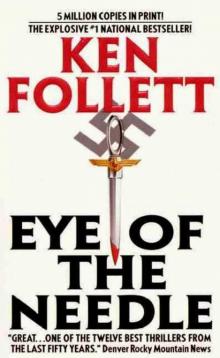 Eye Of The Needle
Eye Of The Needle Lie Down With Lions
Lie Down With Lions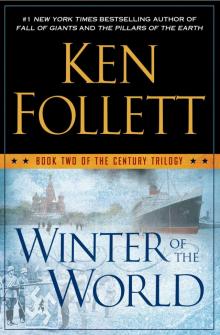 Winter of the World
Winter of the World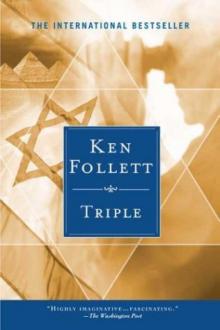 Triple
Triple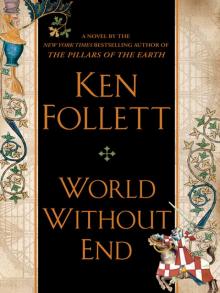 World Without End
World Without End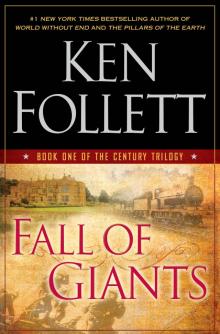 Fall of Giants
Fall of Giants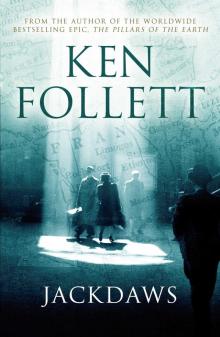 Jackdaws
Jackdaws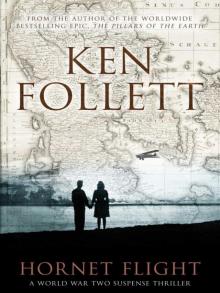 Hornet Flight
Hornet Flight Whiteout
Whiteout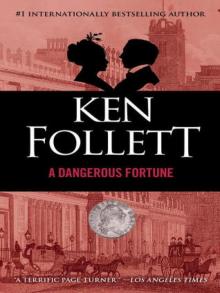 A Dangerous Fortune
A Dangerous Fortune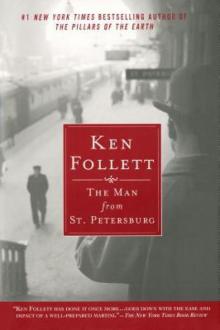 The Man From St. Petersburg
The Man From St. Petersburg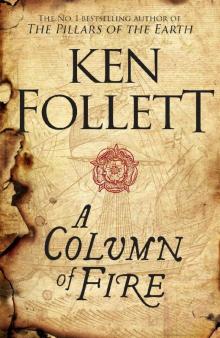 A Column of Fire
A Column of Fire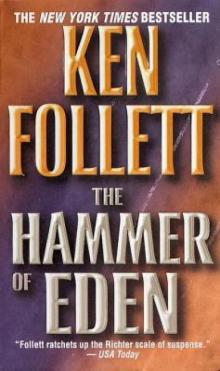 The Hammer of Eden
The Hammer of Eden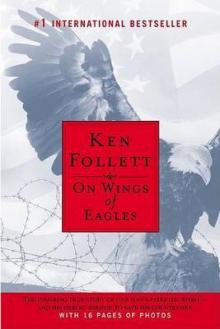 On Wings of Eagles
On Wings of Eagles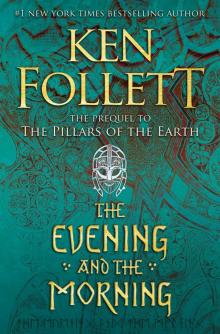 The Evening and the Morning
The Evening and the Morning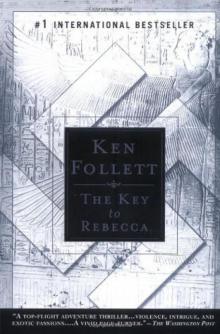 The Key to Rebecca
The Key to Rebecca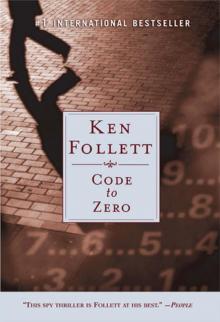 Code to Zero
Code to Zero Paper Money
Paper Money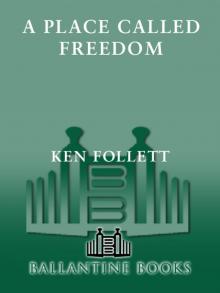 A Place Called Freedom
A Place Called Freedom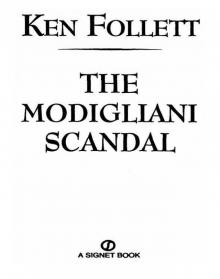 The Modigliani Scandal
The Modigliani Scandal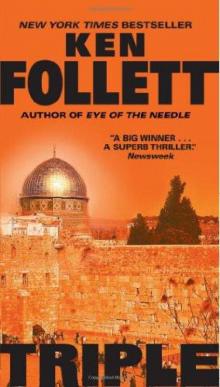 Triple (1991)
Triple (1991)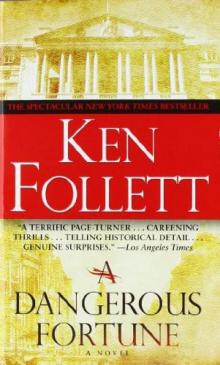 A Dangerous Fortune (1994)
A Dangerous Fortune (1994)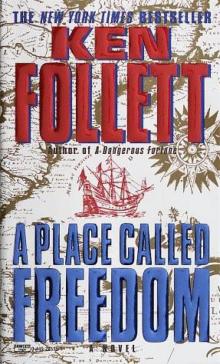 A Place Called Freedom (1995)
A Place Called Freedom (1995)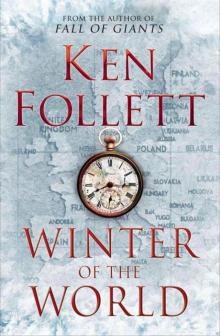 Winter of the World (Century Trilogy 2)
Winter of the World (Century Trilogy 2)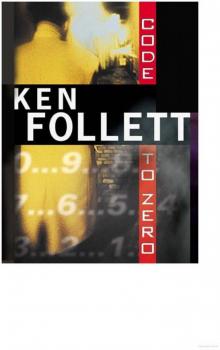 Code to Zero (2000)
Code to Zero (2000)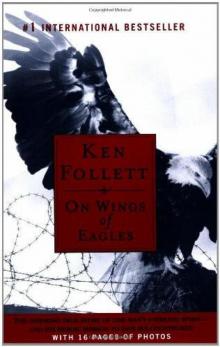 On Wings Of Eagles (1990)
On Wings Of Eagles (1990) Storm Island
Storm Island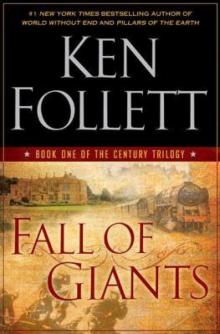 Fall of Giants (The Century Trilogy)
Fall of Giants (The Century Trilogy)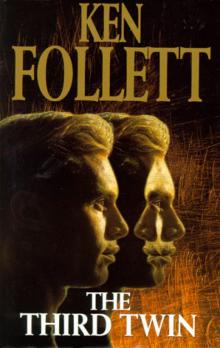 the Third Twin (1996)
the Third Twin (1996)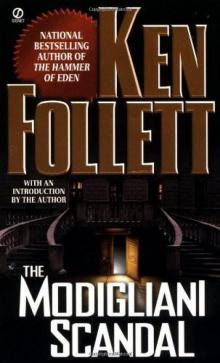 The Modigliani Scandal (1976)
The Modigliani Scandal (1976)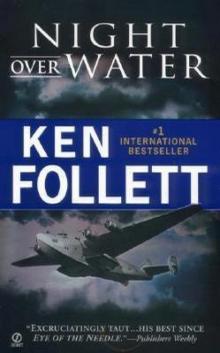 Night Over Water
Night Over Water